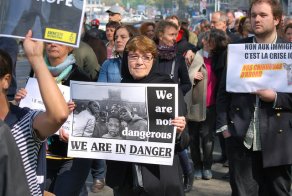
In Brussels, more than 1,200 people protest against Europe’s unwillingness to do more about the refugee crisis in the Mediterranean, April 23rd, 2015. Photo: Amnesty
Today, one in every 122 humans living on the planet is a refugee, an internally displaced person, or an asylum-seeker. In 2014, conflict and persecution forced a staggering 42,500 persons per day to leave their homes and seek protection elsewhere, resulting in 59.5 million total refugees worldwide. According to the UN refugee agency’s 2014 Global Trends report (tellingly entitled World at War), developing countries hosted 86% of these refugees. Developed countries, such as the U.S. and those in Europe, host only 14% of the world’s total share of refugees.
Yet public sentiment in the West has been tough on refugees lately. Resurgent populist and nationalist leaders routinely play to public anxieties about refugees as “lazy opportunists,” “burdens,” “criminals,” or “terrorists” in response to today’s refugee crisis. Mainstream parties aren’t immune to this rhetoric either, with politicians of all stripes calling for increased border controls, detention centers, and the temporary suspension of visa and asylum applications.
Importantly, none of these panicky characterizations of refugees is born out by systematic evidence.
- Read more at Political Violence @ a Glance, where the full text was posted 26 Jan 2016